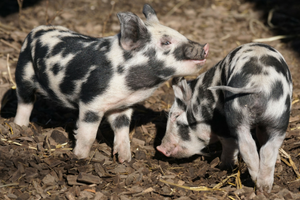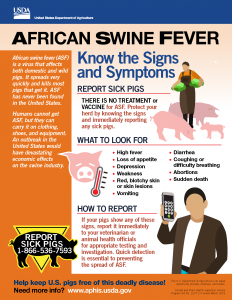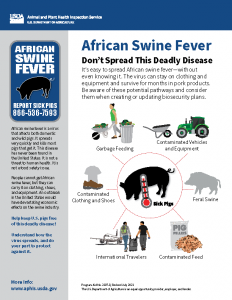Services
Video Biosecurity at Pig Shows: Keeping Your Pigs Healthy During Show Season!
September 2018 DDA Animal Health Advisory: African Swine Fever
Disease Information
African Swine Fever (ASF) 
While the United States has never had a case of African Swine Fever (ASF), the growing number of diagnosed cases occurring in Asia, parts of the European Union, and the recent detection of ASF in the Dominican Republic have raised concern for our domestic pork industry. The highly contagious nature of this virus is very threatening and there is currently no vaccine. Swine producers need to be aware of signs of ASF, communicate with their veterinarians, and increase biosecurity to protect their herds. Even a farm with just a few pigs could become infected and spread the virus to other farms in Delaware. The ASF virus does not pose a threat to human health or food safety.
 What are the signs of ASF in pigs?
What are the signs of ASF in pigs?
Clinical signs of ASF vary widely but often include high fever, decreased appetite, weakness, and unwillingness to stand. The skin may be blotchy, reddened, or have blackened lesions. Pigs may exhibit discharge around the eyes. Infected pigs may exhibit diarrhea (sometimes bloody), vomiting, coughing, and difficulty breathing. Pregnant sows may abort, have stillbirths, or weakened litters. Photos of pigs affected with ASF.
High mortality in a herd is the most significant sign that warrants a call to a veterinarian. Death generally occurs 7 days to 10 days after the disease is first noted; however, sudden death can occur in newly exposed herds. Animals that recover can carry and shed the virus for several months.
If your veterinarian suspects ASF, they will notify the Delaware Department of Agriculture so we can visit your farm to collect samples for testing.
What to do if you suspect ASF in your herd?
If you notice illness or death in your herd that cannot be easily explained, it is very important that you notify your veterinarian immediately. If you don’t have a veterinarian, call the Delaware Department of Agriculture for contact information for a local veterinarian, at 302-698-4500 (during business hours) or 302-233-1480 (after-hours emergency number). Because the signs of ASF are similar to many diseases in pigs, it may not be possible to determine if a pig has ASF just by looking at it. A laboratory test needs to be performed to confirm whether your animals have been infected with ASF.
Keep in mind that the signs of ASF can be similar to other more common diseases – so if you have any doubt about your herd’s health, please reach out to us at the Department using the numbers listed above.
How is ASF spread?
The virus is easily spread between pigs by direct contact or indirectly from contact with contaminated objects. Research shows the virus can survive in the environment, on shoes, clothing, vehicles, and in feed components. Uncooked or undercooked meat, including refrigerated and frozen products, can carry the virus, making garbage feeding and smuggled food items a major threat. Feeding garbage to pigs is illegal in Delaware. Certain species of ticks can spread the virus, while flies and other bloodsucking insects, such as mosquitoes and biting flies, may be able to spread the virus.
What to do if you suspect ASF on your farm
You must immediately contact your veterinarian or call DDA at 302-698-4500 during business hours or use our after-hours emergency number at 302-233-1480.
Biosecurity
 Biosecurity involves all the steps that your farm takes to keep your animals safe and disease-free and protect your fellow producers in the area. Maintaining a high level of on-farm biosecurity is the best protection. Everyone on the farm needs to understand what your farm’s biosecurity plan involves and follow it at all times to reduce the chance of disease entering your farm or spreading on/off your farm.
Biosecurity involves all the steps that your farm takes to keep your animals safe and disease-free and protect your fellow producers in the area. Maintaining a high level of on-farm biosecurity is the best protection. Everyone on the farm needs to understand what your farm’s biosecurity plan involves and follow it at all times to reduce the chance of disease entering your farm or spreading on/off your farm.
- Maintain a healthy herd. Work with your veterinarian to ensure that your animals are up to date on vaccinations, routine veterinary care, and have the proper feed ration for their production stage.
- Purchase or borrow animals from disease-free herds. When possible, purchase animals from herds that test negative, not just the animals you are buying, from diseases such as Brucellosis, Porcine Epidemic Diarrhea, and Pseudorabies. Make sure to isolate all new animals from the herd for 30 days, including those that you are borrowing for breeding. During the isolation period, keep the new pigs from sharing the following with your herd: airspace, fence line contact, drainage areas, equipment, coveralls, and boots. Keep dedicated clothing in the isolation area.
- Keep housing, pastures, and your farm clean. Remove manure and mortality regularly to help limit the spread of intestinal parasites and disease. Manure removal helps reduce flies that can spread disease. Make sure to follow nutrient management protocols outlined by the Delaware Nutrient Management Program.
- Keep wildlife and insects under control. Dispose of unused, broken equipment; unusable food and water containers; and trash that can serve as reservoirs for mosquitos and rodents that can transmit disease. Keep wildlife out of pig areas to reduce transmission of zoonotic diseases.
- Control movement on and off your farm. When you visit livestock shows, sales, open houses, other farms, slaughter facilities, or anywhere pigs are present, take extra precautions to make sure you do not carry disease home to your herd. You should keep shoes and clothing that you wear to shows, sales, etc. separate from the on-farm clothes that you wear when working with your own pigs. Take a few extra minutes to disinfect your shoes/boots before getting into your vehicle to head home. If you are not able to disinfect your shoes, at least brush off dirt and manure before getting into your vehicle. Do not park your vehicle near your pig housing or when visiting others to avoid bringing disease home or carrying disease to other farms. After visiting another site that has pigs, it is best to shower and change clothes before working with your own pigs.
- Don’t let visitors and workers carry disease onto your farm and into your herd.
Create a visible boundary that clearly shows the separation between the outside/inside of your pig area. Mark the line with signs posting no entry. Use physical barriers such as gates, fences, and chains to keep the areas separate and discourage people who do not belong to stay out.
Examples of service groups that should not cross into your pig area because they visit multiple farms and could bring disease in on their vehicles, include:
-
- Feed delivery trucks – place feed storage outside of the line of separation.
- Trucks hauling pigs – loading/unloading ramp placed outside of the line.
- Garbage trucks – picked up near the end of the driveway if possible.
- Deadstock haulers – Designate a place for pickup away from the pig area.
Farmworkers, veterinarians, extension agents, buyers, electricians, plumbers, etc. that must cross the line of separation, need to follow these rules:
-
- Park vehicles away from pig housing and outside the line of separation.
- Shower and change all clothes, including hats, after working with other people’s pigs before coming to your farm.
- Have no contact with other pigs (including sales and shows) at least overnight before visiting your farm.
- Has not traveled out of the United States for at least five days.
- May not exhibit any flu-like symptoms or symptoms of any illness.
- Needs to wear disinfected footwear and clean coveralls.
- Use the provided farm footbath before crossing the line, removing dirt and manure from footwear, and then scrub footwear with disinfectant before entering the pig area.
- Don’t let pigs bring diseases back to the farm. Any pig that leaves the farm, is new to the farm, or is borrowed from another farm needs to be isolated for 30 days to prevent the introduction of diseases and parasites. This includes animals that have gone to the veterinary hospital, a livestock show, a petting zoo, or were on loan for breeding. During the isolation period, keep the new pigs from sharing the following with your herd: airspace, fence line contact, drainage areas, equipment, coveralls, and boots. Keep dedicated clothing in the isolation area. Because you cannot test for every disease, it is important that you follow the isolation period and observe your animals for signs of illness.
- Write a farm biosecurity plan – use it, evaluate it, and update it. A biosecurity plan is not something you write and stick on a shelf. It is important to take the time to walk through your farm to find where the pitfalls are where disease could enter and be a risk to your herd. Invite your veterinarian, extension agent, and other animal health officials to walk through with you to discuss biosecurity. When writing your plan, make sure to record who is responsible for each action area (e.g., who cleans the footbath, who monitors for rodent control, etc.). Educate everyone who works on the farm or has a role working with your pigs on what your biosecurity plan entails. If you make any changes, meet with your team and share those changes. Every three months, conduct a walk-thru and evaluate what is and is not working in the plan, and then update it. If a disease outbreak occurs, having an active biosecurity plan in place will go a long way to protecting your herd and other farms in the state.
Resources for Producers
African Swine Fever Fast Facts (Center for Food Security and Public Health)
African Swine Fever: What You Need to Know (National Pork Board)
USDA African Swine Fever Webpage
African Swine Fever: Don’t Spread this Deadly Disease (English)
African Swine Fever: Don’t Spread this Deadly Disease (Spanish)
African Swine Fever: Know the Signs and Symptoms (English)
African Swine Fever: Know the Signs and Symptoms (Spanish)
Producers and Employees: How to Protect Your Herd (Center for Food Security and Public Health)
International Travel Biosecurity (National Pork Board)
Hosting International Visitors on Your Farm (National Pork Board)
Resources for Veterinarians
African Swine Fever: Technical Factsheet (Center for Food Security and Public Health)

 What are the signs of ASF in pigs?
What are the signs of ASF in pigs? Biosecurity involves all the steps that your farm takes to keep your animals safe and disease-free and protect your fellow producers in the area. Maintaining a high level of on-farm biosecurity is the best protection. Everyone on the farm needs to understand what your farm’s biosecurity plan involves and follow it at all times to reduce the chance of disease entering your farm or spreading on/off your farm.
Biosecurity involves all the steps that your farm takes to keep your animals safe and disease-free and protect your fellow producers in the area. Maintaining a high level of on-farm biosecurity is the best protection. Everyone on the farm needs to understand what your farm’s biosecurity plan involves and follow it at all times to reduce the chance of disease entering your farm or spreading on/off your farm.